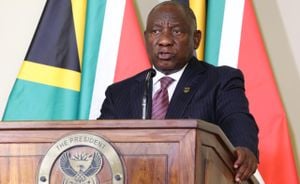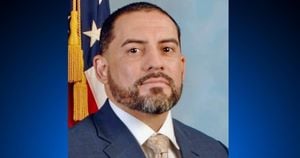BJP national general secretary Vinod Tawde took legal action against key leaders of the Congress party, including Congress President Mallikarjun Kharge, Lok Sabha Leader of the Opposition Rahul Gandhi, and party spokesperson Supriya Shrinate. This action follows serious allegations claiming Tawde was caught distributing large sums of cash to voters right before the Maharashtra Assembly elections. The gravity of Tawde's accusations reflects not only his pushback but also the heated political climate surrounding the recent elections.
The legal notice, issued on November 22, demands the Congress leaders to publicly apologize within 24 hours. Failure to comply could lead to civil defamation proceedings amounting to ₹100 crore (~$12 million) as well as potential criminal charges. According to Tawde's lawyer, the accusations made by the Congress leaders are “baseless” and intended to tarnish Tawde’s reputation and by extension, the image of the Bharatiya Janata Party (BJP).
Allegations arose on November 19 when Bahujan Vikas Aghadi (BVA) activists accused Tawde and other BJP members of distributing approximately ₹5 crore (~$600,000) at a hotel situated in Virar, Maharashtra. A video surfaced purportedly showing BVA members claiming they saw Tawde with cash, which was widely circulated on social media. This incident not only stirred controversy but also placed significant pressure on the BJP just days before voting began.
Tawde has categorically denied these allegations. He stated, “My only job on the election eve was to meet with local MLAS to outline election procedures. I was not involved with any cash distribution.” He emphasized his belief the claims were unfounded, adding, “I come from a regular middle-class family. For the last 40 years, I have been involved with politics. I have never conducted myself unethically.”
The immediate fallout has been dramatic, with Tawde insisting on transparency and claiming confidence his name will be cleared by conducting thorough investigations. He has called for the Election Commission and the police to probe the incident without any biases. Reflecting his determination, Tawde stated he would allow CCTV footage from the hotel to be reviewed as evidence.
Gandhi and Kharge rapidly capitalized on this situation, with Gandhi questioning the source of the alleged money, asking “Modiji, whose ‘safe’ did these ₹5 crores come from?” He asserted the BJP was willing to utilize both financial and political muscle to secure votes, whereas Kharge reiterated similar sentiments about alleged BJP malpractice during election season.
The controversy reached lawmakers as well, as BJP leaders, including MP Sambit Patra, defended Tawde vocally. Patra claimed the accusations lacked substantial evidence and issued challenges to the Congress to present any factual basis to their claims. Tawde also questioned the timing of the allegations, indicating they were purposely timed to undermine the BJP’s presence just before the elections.
What intensified the curiosity around Tawde's actions was the incident's occurrence at the purported hotel owned by influential local political families. Tawde’s public defense included claims those implicatory accusations were politically motivated. During the tumultuous buildup to the elections, the accusations positioned Tawde at the epicenter of potential election misconduct, creating waves of tension between competing political factions.
Following the allegations, police registered two FIRs against Tawde and others involved, reflecting how serious the political discourse has become within the region. The Election Commission also filed three FIRs stemming from the incident, bringing heightened scrutiny on the process and principles surrounding the electoral system.
Although Tawde's legal threat focuses on demanding repentance from the Congress leaders, it also underlines broader themes prevalent during elections, where accusations of corruption and unethical behaviors often surface. The political dynamics surrounding this situation exemplify the charge and countercharge often seen on the playing field of Indian politics, underscored by the fact these allegations surfaced during heated election preparations.
With the elections concluded, this situation's ramifications extend beyond just Tawde and the Congress leaders involved. Both parties are now left to contemplate their strategies moving forward, as the fallout could have significant impacts on their respective political images and party foundations.
Legal experts have noted the case could set precedents for how allegations of this nature are determined and how political figures interact during the festivals of democracy. Tawde's calls for transparency, along with his legal maneuvers, highlight the cleaved political atmosphere surrounding these elections.
The accusations and counterclaims are reflective of the fiercely competitive nature of Indian politics and could serve to entrench rivalries for years to come. With each party leveraging the situation to either defend their reputation or undermine opponents, it remains to be seen how this will play out amid the aftermath of the recent polling.



